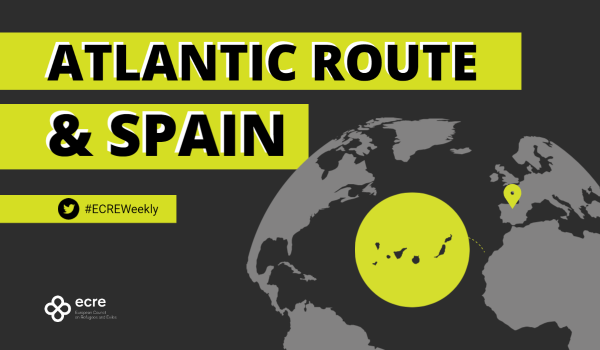The NGO Walking Borders has reported that around 7618 women, men and children died attempting to reach Spain. Meanwhile, people continue to take perilous journeys using different migratory routes despite interceptions by Spain’s African partners and risk of death.
A new report by the NGO Walking Borders marked 2023 as the “deadliest year” since it began keeping records. According to the organisation, 18 people died every day on the different migratory routes leading to Spain. Up to 6618 people lost their lives on the Western Euro-African border, including 363 women and 384 girls and boys. This high number of recorded deaths confirms once again that the Canary Islands route is the “deadliest migratory region in the world”. Walking Borders also discovered that the most serious issues causing these tragedies are the prioritisation of border control over the duty of relief, the failure to activate search and rescue means with the necessary urgency, the increasingly common practice of passive searches, the impact of the externalisation of borders with third countries or the reduction of means intended for the protection of life. Journalist Txema Santana wrote on X: “Who are they? Who are the more than 6,000 people killed on the Canary Islands route? There is no name for the majority” (translated). She also introduced one of the identified victims: Moustapha Toumbou. He was a 34-year-old man who lived in Dakar from where his canoe left for Europe in September 2023. In 2023, 56,852 people attempted to enter Spain irregularly by sea or land, an 82.1% increase on the previous year, according to data from the Spanish Interior Ministry. Of them, 39,910 were counted off the Canary Islands’ coasts, 154.5 % more than in 2022. This high number of arrivals makes Spain the “second EU country with the most irregular entries”, a position which has been linked to the “big jump in small ships making the perilous journey from Senegal to the small Canary Island of El Hierro”. ECRE member organisation the Spanish Commission for Refugees (CEAR) wrote: “2023 has been the second year with the most arrivals to Spain by sea. More and more people have to risk their lives on deadly journeys due to the lack of legal and safe routes” while hoping for a new year where “no one has to risk their life to try to save it” (translated).
Meanwhile, fatal crossing attempts to reach Spain continue. On 7 January, Salvamento Marítimo vessel rescued a young man clinging to a truck tyre adrift in waters near Fuerteventura while transferring the occupants of a boat that he had helped minutes before. On 2 January, at least 248 migrants arrived in the Canary Islands after four separate rescue operations. On 3 January, the bodies of the five men who had remained on board a canoe that had been rescued on 30 December about 280 kilometers south of El Hierro with 15 survivors and in which between 30 and 40 people died when they were thrown overboard during the 15-day-long crossing. Journalist Santana wrote on X: “Almost 100 boats disappeared with all their occupants. There were more than 180 shipwrecks in the Sea of Deaths. And you know what: in 2024 people have already died and more will die. And some of this unfortunate reality may not be avoidable. But a good part yes” (translated). Meanwhile, on 31 December, the Moroccan navy, Spain’s “essential ally”, intercepted 44 sub-Saharan migrants who were attempting to reach the Canary Islands. According to the Moroccan media outlet MWN, upon interception, the rescued individuals received the necessary medical attention before being transported to the port of Dakhla. Spanish Interior Minister Fernando Grande-Marlaska said recently that the Spanish police co-operation with several African countries “prevented the arrival in Spain of over 27,000 migrants in 2023” without identifying departures from African countries to Europe were being prevented. Marlaska said co-operation aimed at fighting migrant smuggling and the prevention of migrant departures means “having saved lives” as it prevents migrants from undertaking “dangerous sea crossings in difficult conditions.” Meanwhile, ECRE member organisations CEAR and Accem have called on the Spanish authorities to invest in countries of origin to reduce migratory pressure in addition to guaranteeing “legal and safe routes” for people who arrive in Spain by irregular means. Although it is “difficult” to determine the increase in migrant arrivals in Spain, CEAR emphasised that the pandemic had prevented a huge number of migrants from crossing to Europe but that they were now able to do so.
A 19-year-old young man who reportedly arrived in Spain by the sea route died on 10 January. “He had a residence and tried, with training, to be included in society, but the street ended up weighing him down. Few knew that he was homeless, like so many”, journalist Txema Santana wrote, adding that “pneumonia forced its way into his body and after several days in a coma he died this morning. The little boy had all the will.”
For further information:
- ECRE, Atlantic Route and Spain: Increase of Arrivals to Canary Islands Amid Ongoing Deaths and Distress, Senegal Receives Drones & Guards from Spanish Government to Curb Boat Departures, December 2023
- ECRE, Atlantic Route and Spain: Government Expects to Deliver on Pact Despite Parliament Elections, Melilla Victims Still Waiting for Justice, Lack of Rescue Coordination with Morocco Continues to Cost Lives, June 2023

